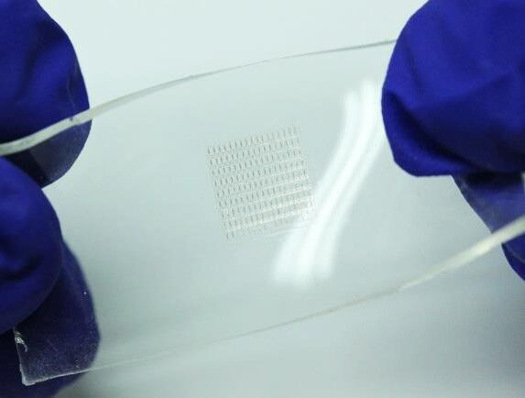 |
| July 26, 2016 | Volume 12 Issue 28 |
Designfax weekly eMagazine
Archives
Partners
Manufacturing Center
Product Spotlight
Modern Applications News
Metalworking Ideas For
Today's Job Shops
Tooling and Production
Strategies for large
metalworking plants
Scientists develop plastic flexible magnetic memory device
It looks like a small piece of transparent film with tiny engravings on it, and it's flexible enough to be bent into a tube. Yet, this piece of "smart" plastic demonstrates excellent performance in terms of data storage and processing capabilities.
The novel invention, developed by researchers from the National University of Singapore (NUS), hails a breakthrough in the flexible electronics revolution and brings researchers a step closer toward making flexible, wearable electronics a reality in the near future.

Associate Professor Yang Hyunsoo from the National University of Singapore, who led a research team to successfully embed a powerful magnetic memory chip on a plastic material, demonstrating the flexibility of the memory chip. [Photo credit: National University of Singapore]
The technological advancement is achieved in collaboration with researchers from Yonsei University (Seoul, South Korea), Ghent University (Belgium), and Singapore's Institute of Materials Research and Engineering. The research team has successfully embedded a powerful magnetic memory chip on a flexible plastic material, and this malleable memory chip will be a critical component for the design and development of flexible and lightweight devices. Such devices have great potential in applications such as automotive, healthcare electronics, industrial motor control and robotics, industrial power and energy management, and military and avionics systems.
And amazingly, they can outperform many current top-of-the-line memory materials in use.
The research team, led by Associate Professor Yang Hyunsoo of the Department of Electrical and Computer Engineering at the NUS Faculty of Engineering, published their findings in the journal Advanced Materials on 6 July 2016.
Flexible, high-performance memory devices a key enabler for flexible electronics
Flexible electronics has become the subject of active research in recent times. In particular, flexible magnetic memory devices have attracted a lot of attention as they are the fundamental component required for next-level data storage and processing in wearable electronics and biomedical devices, which require various functions such as wireless communication, information storage, and code processing.
Although a substantial amount of research has been conducted on different types of memory chips and materials, there are still signi?cant challenges in fabricating high-performance memory chips on soft substrates that are flexible, without sacri?cing performance.
To address the current technological challenges, the research team, led by Yang, developed a novel technique to implant a high-performance magnetic memory chip on a flexible plastic surface.

Magnetic memory chip on plastic material. [Photo credit: National University of Singapore]
The novel device operates on magnetoresistive random access memory (MRAM), which uses a magnesium oxide (MgO)-based magnetic tunnel junction (MTJ) to store data. MRAM outperforms conventional random access memory (RAM) computer chips in many aspects, including the ability to retain data after a power supply is cut off, high processing speed, and low power consumption.
MRAM chip on a flexible plastic surface
The research team first grew the MgO-based MTJ on a silicon surface, and then etched away the underlying silicon. Using a transfer printing approach, the team implanted the magnetic memory chip on a ?exible plastic surface made of polyethylene terephthalate while controlling the amount of strain caused by placing the memory chip on the plastic surface.
"Our experiments showed that our device's tunneling magnetoresistance could reach up to 300 percent -- it's like a car having extraordinary levels of horsepower," says Yang. "We have also managed to achieve improved abruptness of switching. With all these enhanced features, the flexible magnetic chip is able to transfer data faster."
"The magnetoresistance (MR) is a key attribute to describe the performance of magnetic sensors and memories," continues Yang. "A higher MR device will lead to less operation error and fast data-reading operation. For example, a typical hard disk magnetic sensor has an MR of 10 percent to 50 percent. Commercialized MRAM has a MR less than 100 percent. Our devices have an MR of 300 percent."
Commenting on the significance of the breakthrough, Yang says that flexible electronics will become the norm in the near future, and all new electronic components should be compatible with flexible electronics.
"We are the first team to fabricate magnetic memory on a flexible surface, and this significant milestone gives us the impetus to further enhance the performance of flexible memory devices and contribute towards the flexible electronics revolution," he says.
So what's the big payoff?
"In general, MRAM is about 1,000 times faster than typical FLASH memory, and MRAM will have 100 times more storage capacity than FLASH," explains Yang. "Our contribution is to show that MRAM can go as a flexible form."
Yang and his team were recently granted United States and South Korea patents for their technology. They are conducting experiments to improve the magnetoresistance of the device by fine-tuning the level of strain in its magnetic structure, and they are also planning to apply their technique in various other electronic components. The team is also interested to work with industry partners to explore further applications of this novel technology.
Source: National University of Singapore
Published July 2016
Rate this article
View our terms of use and privacy policy
